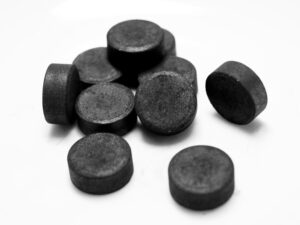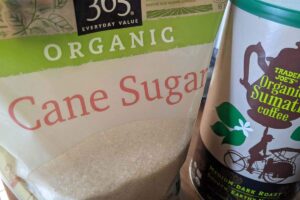Sweet Deceit: Is your sugar refined with bone char?
Written by BSR Web Staff on October 12, 2021
 Bone Char:
Bone Char:
Bone char has been defined as the “black substance containing char in the form of carbonized bone” (Definitions for Bone Char, n.d.). In the past, it has been used for an assortment of uses, more specifically for its use in the refining of sugar. Its first known utilization in this process has been dated back to the 1800’s where its implementation caused the clarification of sugar. According to Oliver Lyle’s book: Technology for Sugar Refinery Workers,
“bone charcoal, or ‘char’, as we call it, is a sugar refining material quite unequalled by anything else. . . there is no other material which removes the colour and removes quite a lot of ash as well which is moderate price, which lasts for many years, and which stands up to rough treatment without rapid loss of efficiency (2015).”
However, due to modern technology and the growing awareness of eating healthier with more meat-free options to consider, the refining process would take a turn towards other alternatives.
Alternatives:
It’s important to note that, the “United States organic laws do not have any strict standards regarding the color of organic sugar, unrefined sugar is naturally light tan to brown” (Yacoubou, 2007). There are plenty of alternatives and ways to look for the best sugar that’s free from any animal products. For example, beet sugar and coconut sugar, never go through the process of using bone char.
 Organic Sugars:
Organic Sugars:
Labels that say organic indicate that the sugar is dealt without the inhumane use of animal bones, where according to a Maryland-based nonprofit organization Vegetarian Resource Group, “around 7,800 cows are needed for a single commercial sugar filter” (Ho, 2021). It’s interesting to note that although some sugars may be labeled as organic, not all our considered to be 100% so. This is due to the “common processing aid, lime, used as a clarifying agent in organic cane sugar processing, removing cane fibers and field debris however, because the lime itself is synthetic, no organic sugar processed in this manner can ever be certified 100% USDA Organic” This makes it 95% certified organic but this sugar is still processed without the use of bone char, which makes the maker and buyer of this sugar involved with a more humane choice nonetheless.
Vegan Sugar:
Sugar products labeled as vegan are one of the sole indicators that give a buyer a sense of ease knowing that no animals were ever harmed in the refining process.
Bone Char Free Companies:
By simply putting in the google search, ‘bone char free sugars’, the internet is unable to give a direct response. However, there have been more recent factual articles becoming available that are able to aid a conscientious sugar buyer towards the right product. For example, Moreno and Florida Crystals. Here are a few more bone char-free products that are produced within the United States:
| Company | Brand Name |
| C & H Sugar | C & H Pure Cane Washed Raw Sugar
C & H Pure Cane Certified Organic Sugar |
| Cumberland Packing Company | Sugar in the Raw |
| Domino Sugar | Domino Demerara Washed Raw Cane Sugar
Domino Pure Cane Certified Organic Sugar |
| Great Eastern Sun | Sweet Cloud Organic Raw Cane Sugar |
| Tropical Traditions | Rapadura Whole Organic Sugar |
For more information, check out the links provided below in the references.
References
Bernard, L. (2020, July 28). Is sugar vegan? Make It Dairy Free. Retrieved October 10, 2021
Yacoubou, J. (2007). Is your sugar vegan? The Vegetarian Resource Group. Retrieved October 10, 2021
Definitions for bone char. What does Bone char mean? (n.d.). Retrieved October 10, 2021




